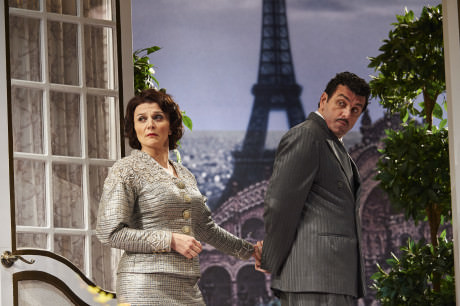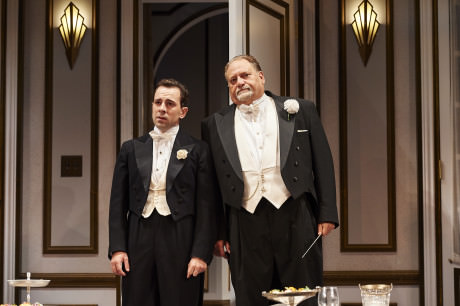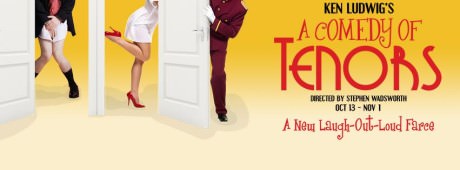Is A Comedy of Tenors, Ken Ludwig’s newest comedy, a worthy successor to Lend Me a Tenor, his knockabout farce that opened on Broadway in 1989 and has been produced in hundreds of theatres around the world ever since? Certainly. Is it as good as the original? Well, not quite. It feels less inspired than the previous play, and the premise seems more contrived (which, for a Ludwig play, is saying something). But it’s so funny, and performed with such skill in Director Stephen Wadsworth’s gleaming production, that you may be too busy laughing to care. (And if you don’t know the original, don’t worry – you won’t feel you missed anything, and it won’t make any difference anyway.)

It’s 1936 – two years after the events of Lend Me a Tenor – and in the first scene, Ludwig reintroduces us to four of that play’s characters. First comes Saunders, the hotheaded perfectionist who is one of the world’s top opera producers. Next comes Max, who was Saunders’ put-upon assistant in the first play; now he’s moved on and has achieved two of his goals – becoming a successful opera singer himself and marrying Saunders’ daughter Maggie (who is unseen this time around).
And finally, there are the temperamental superstar tenor Tito Merelli and his tempestuous wife Maria. We’re in a hotel suite again, but this time we’re in Paris instead of Cleveland. And instead of a production of Otello, this time Saunders is producing the biggest, most glamorous opera concert ever, held at a soccer stadium. (It’s as if Ludwig felt he had to raise the stakes to justify revisiting these characters.)
Tito, Max and a Swedish tenor are scheduled to perform before tens of thousands of fans in a few hours, but already things are falling apart. First the Swedish singer backs out, so Saunders hires the hottest new star in the opera world, Carlo Nucci, to fill in. Unfortunately, Saunders doesn’t know that the aging Tito is intensely jealous of young Carlo’s success – or that Carlo is having a secret affair with Tito and Maria’s daughter Mimi, an aspiring actress. Soon Tito flies into a rage after he overhears a conversation that makes him think that Maria, and not Mimi, is Carlo’s lover. Tito storms out, and it looks like Saunders might have to cancel the concert… that is, until Beppo, an opera-singing bellhop who looks exactly like Tito, shows up at the door.
Of course, this being a Ken Ludwig play, that’s not the end of the complications; it’s only the end of act one. (I haven’t even mentioned Tatiana, the Russian soprano who shows up in act two to rekindle her old romance with Tito and throw another monkey wrench into the works.)
So, how does it all fit together? For the most part, this is more of the same from Ludwig – but he’s a master at this type of boisterous comedy, so more of the same is a good thing. There’s less door-slamming this time around, but there are some good running verbal gags and some sensational physical gags. And there’s a marvelous change-of-pace scene in act one where the three tenors rehearse a number from La Traviata. As they sing, they get more and more wrapped up in the music, allowing it to transport them – and the audience. This scene allows Ludwig to demonstrate that these people are not just comic figures; they’re serious, skilled musicians with a love for their art. It helps that Bradley Dean (Tito) and Bobby Conte Thornton (Carlo) have rich, authentic, operatic-quality voices. Rob McClure (Max) has a lighter, Broadway-style tenor, but he can fake the operatic style reasonably well.
But A Comedy of Tenors is not the well-oiled machine that Lend Me a Tenor is. Some of it feels rather awkwardly constructed. For instance, when the Swedish tenor backs out of the concert, it’s to attend his mother’s funeral – which prompts Saunders to erupt in rage. The jokes in this sequence aren’t funny, and they make Saunders seem unsympathetic. (Wouldn’t you rather attend your mother’s funeral, too?) From that point on, it’s hard to root for Saunders to get his concert on the stage. I hope Ludwig will change this entire sequence. It also strains credulity that Saunders would stage a huge concert without allowing any time for rehearsal – and as the clock ticks down and the concert gets closer, one can’t help but feel that if the concert did get canceled, Saunders would just be getting the comeuppance he deserves.

There’s also a series of jokes about Saunders’ hometown of Akron, Ohio – jokes which probably got laughs when this production played at the Cleveland Play House last month but which fall flat in Princeton, New Jersey. The lookalike plot device gets a lot of laughs, but it’s never fully explained, and instead of worrying about the characters, I spent my time wondering about how Dean was pulling this off. (The use of an obviously pre-recorded vocal track when Dean was offstage at one point answered my question.)
A tender moment in act two provides an interesting respite from the comedy, but the kindhearted words come from the lookalike Beppo, so they don’t humanize characters we actually care about. Some self-conscious jokes that remind us we’re watching a play – “This comes perilously close to French farce,” says Mimi – leave a sour taste. The Russian soprano feels like an afterthought and is never fully integrated with the rest of the characters. And while there’s a sweet, heartfelt moment involving Max at the end, the neatly-tied-up resolution (complete with a halfhearted, last-minute complication) is too cute and out of step with the tone of the show.
Despite this, A Comedy of Tenors is a pretty darn funny play, and it has received a sensational production, with the cast hitting all the right notes. McClure’s Max is appropriately adorable and jumpy (in more ways than one), and Ron Orbach gives Saunders the right measure of bluster. Dean is convincing as two characters with quite different personalities, and Antoinette LaVecchia’s dry delivery as Maria is a pleasure. Thornton is nicely virile as Carlo, and plays off well against Kristen Martin’s striving and sincere Mimi. Lisa Brescia is having a lot of fun slinking around as the soprano. And all of the actors show great skill with physical comedy, especially McClure, Martin, and LaVecchia.
The cast looks great in William Ivey Long’s vivid costumes, which reveal a lot about the characters – from the rich maroon-and-gold bellhop costume for Beppo to the ravishing purple gown for Tatiana to the sweater vest that tells you just how earnest Max is. And it’s all played on Charlie Corcoran’s gorgeous cream-and-brown set, which mixes traditional molding with art deco chandeliers that subtly remind us of the show’s era.
Running Time: Two hours, including one intermission.
A Comedy of Tenors plays through November 1, 2015 in the Matthew Theatre at the McCarter Theatre Center -91 University Place, in Princeton, NJ. For tickets, call the box office at (609) 258-2787, or purchase them online .





